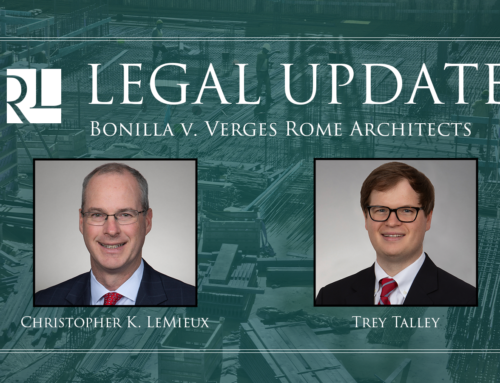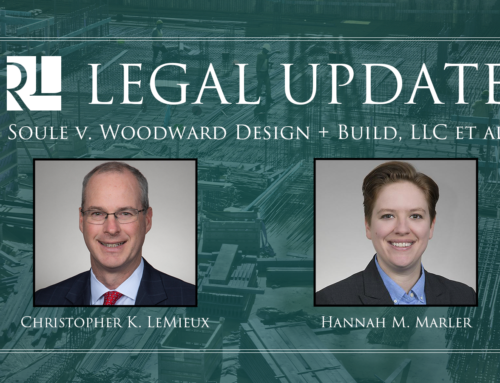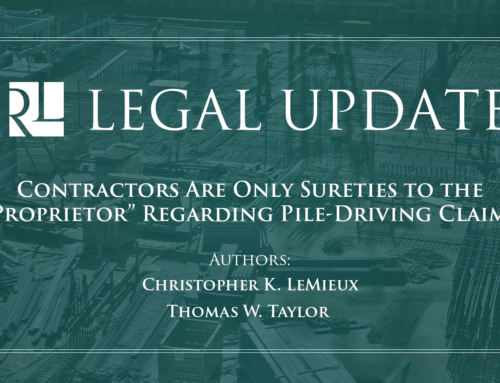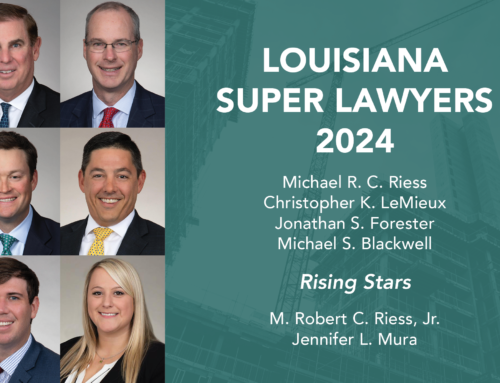In a recent decision concerning the Texas Workers’ Compensation Act (TWCA), the Texas Supreme Court emphasized the high bar plaintiffs must meet to satisfy the narrow “intentional tort” exception in the statute. As in many other states, a Texas worker’s injuries sustained during the course of employment are exclusively governed by the TWCA. The only exception that would allow a worker to sue an employer for damages outside the purview of the TWCA is if the employer intentionally caused the worker’s injuries. The Texas Supreme Court ruled that an employer who commits gross negligence or deliberately ignores a risk of injury to an employee does not meet the definition of “intentional” under the TWCA.
In Berkel & Co. Contractors, Inc. v. Lee, No. 18-0309, 2020 WL 6811718 (Tex. Nov. 20, 2020), a worker was injured as a result of a crane collapse. The plaintiff sued his statutory employer, Berkel & Company Contractors, Inc. (Berkel), for negligence and gross negligence, arguing that Berkel had a specific intent to injure the plaintiff. At trial, the jury was asked whether “a Berkel employee . . . believe[d] that injury was substantially certain to result from his conduct on the date in question?” The jury answered “yes” and awarded damages to the plaintiff. The trial court entered judgment on the jury’s verdict.
The court of appeals reversed, holding that the trial court erred in asking whether a Berkel employee knew that “an unspecified injury, unattached to any particular victim or any particular location, was substantially certain to result.” The court of appeals clarified that the intentional-injury exception has a “specific-consequences requirement.” The question should have been “whether a Berkel employee acting in the course and scope of his employment believed that his conduct was substantially certain to bring about harm to a particular victim, or to someone within a small class of potential victims within a localized area.” The court of appeals then concluded that there was legally insufficient evidence to support a finding of intent to harm because there was no evidence demonstrating that anyone at Berkel knew the plaintiff’s injury would occur.
On rehearing, the court of appeals amended its judgment and remanded the case for another trial. In reviewing the verdict, the court of appeals adopted a localized-area test, implicitly defining “intent” to include knowledge of dangerous conditions that would eventually cause an injury if that knowledge is specific to a particular time and small class of individuals. The appeals court remanded to allow the plaintiff an opportunity to present evidence under the clarified standard. Berkel requested review of the amended ruling with the Texas Supreme Court, seeking a reversal of the court of appeal’s remand order.
The Texas Supreme Court found that the court of appeals correctly concluded that there was not enough evidence to support a finding that Berkel intended to cause the plaintiff’s injury. However, the Texas Supreme Court also held that the court of appeals erred in remanding the case for another trial because the localized-area test was specifically rejected in Mo-Vac Service Co. v. Escobedo, 603 S.W.3d 119 (Tex. 2020). Thus, the clarification of the law justifying the court of appeal’s decision did not exist at the time the decision was made.
The Texas Supreme Court explained in its recent ruling in Mo-Vac that to trigger the intentional-tort exception, there needs to be evidence an employer believed its actions were “substantially certain” to cause a specific injury to a specific employee. The Court observed that while a jury could have concluded a Berkel employee “deliberately ignored the risk of a collapse,” there was no evidence that Berkel’s employee knew the crane would collapse and injure the plaintiff. The Court concluded that although the crane collapse was an “avoidable, unjustifiable and grossly negligent accident,” it fell short of being a “genuine intentional injury.” The ruling emphasizes the high threshold a plaintiff must meet to take advantage of the intentional-tort exception under the TWCA.



